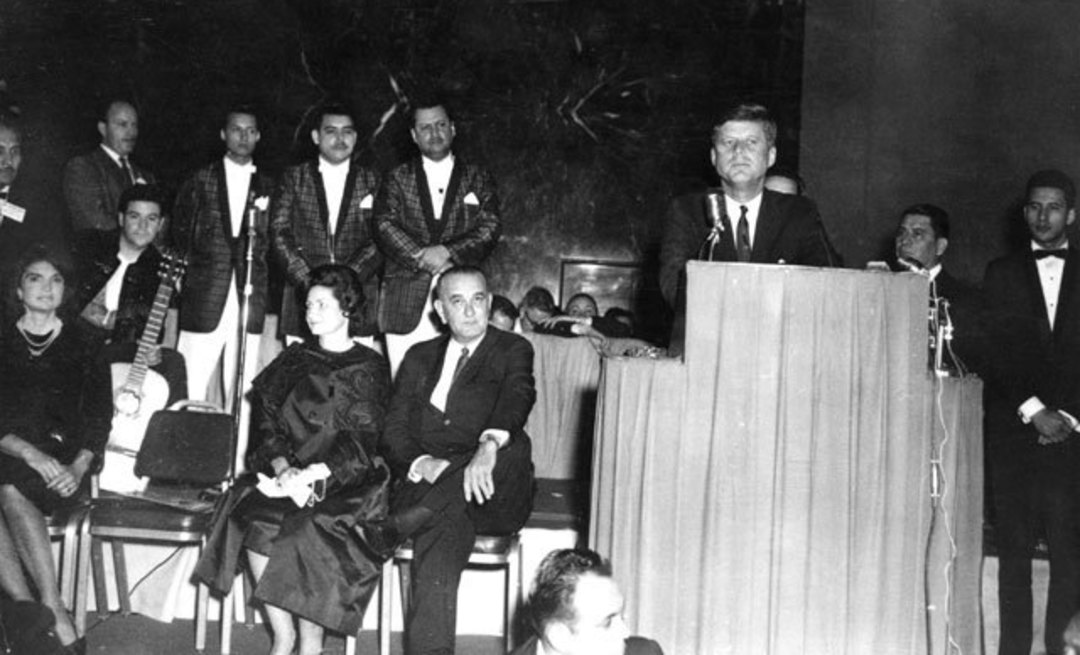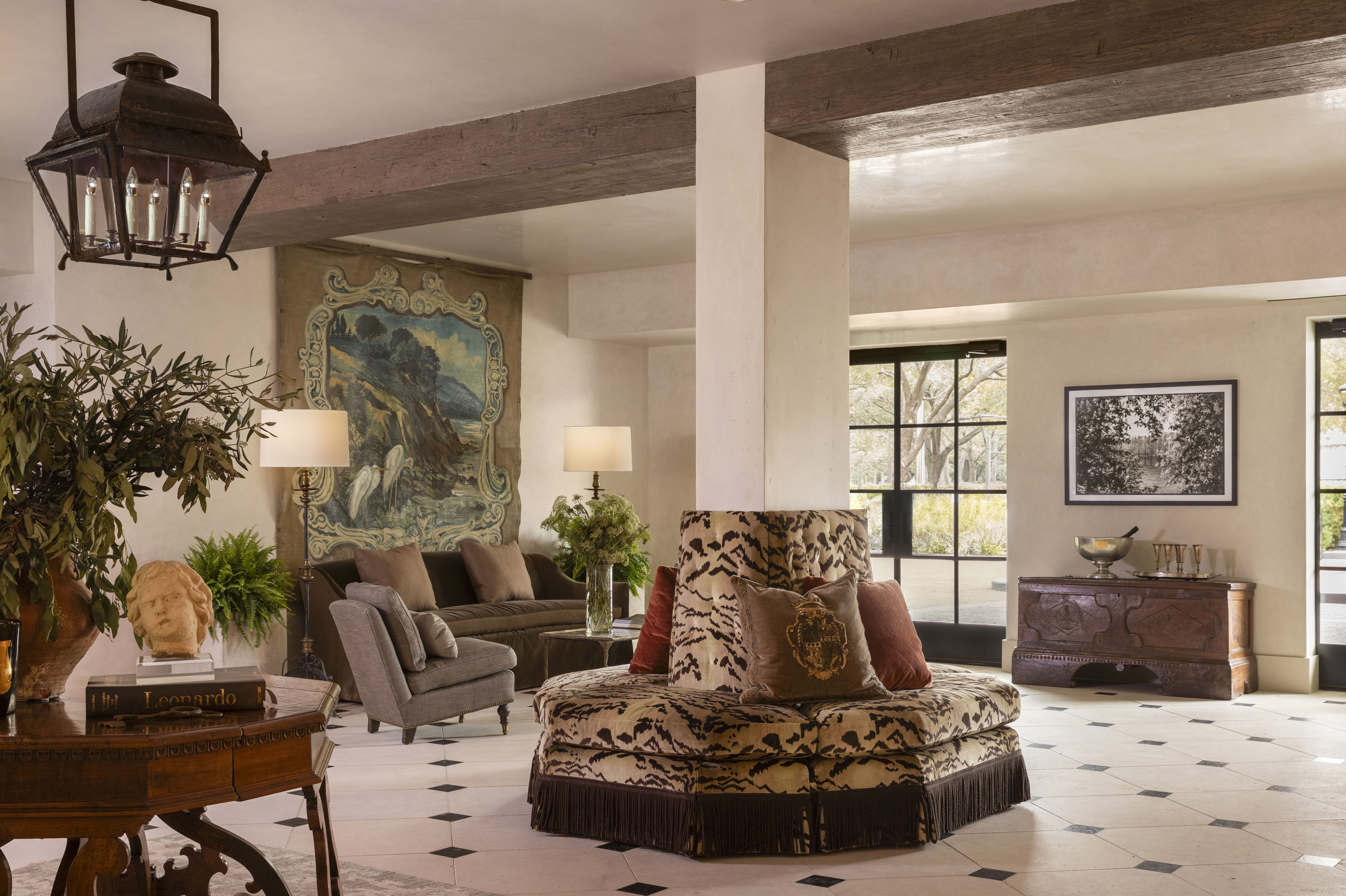The Last Supper

President Kennedy speaks to LULAC the evening before his assassination. Alex Arroyos / John Kennedy Collection, Houston Public Library, HMRC
When President Kennedy arrived in Houston on the afternoon of Thursday, November 21, 1963, it had already been a long day, one that began early in the morning, when he boarded Air Force One at Andrews Air Force Base outside Washington for a flight to San Antonio, the first of three Texas cities the president would visit that day.
Meanwhile in Houston, almost at the same time, Rudy Castro was rushing to prepare for the president’s arrival. Three weeks earlier, Castro and the rest of the staff of the Rice Hotel had learned that Kennedy would be stopping there for a few hours during his brief sojourn in the city. Sitting in the Rice lobby recently, Castro, now 82, recalled the moment that he and his fellow dinner captains learned that they would be hosting Kennedy. “We were ecstatic,” he says. “To have the president of the United States, my goodness. My mother just idolized him.”
According to a new book, JFK’s Last Hundred Days, Kennedy’s motorcade attracted an estimated 100,000 spectators in San Antonio that day. Then, following a speech at the Brooks Aerospace Medical Center, Kennedy got back on Air Force One for the short flight to Houston. Concerned that the crowds might be too small, Kennedy’s team had already decided against a formal motorcade tour through the city, so after touchdown the president’s entourage—which included Vice President Johnson, his wife Lady Bird, and Governor John Connally, among other dignitaries—climbed into waiting Lincoln Town Car convertibles and drove straight to the Rice Hotel.
Despite the president’s concerns, the crowd in Houston was almost as large as the one in San Antonio, with spectators gathering on both sides of Broadway to watch the motorcade leave the airport. One of those lining the route was David Sanders, who had just finished his bachelor’s degree in electrical engineering at the University of Houston. Sanders had voted for Nixon in 1960, but admired Kennedy for his war service. He brought his wife and three children to see the motorcade. “We were standing by the side of the street, and his motorcycle entourage came by,” Sanders remembers. “We had a couple of small children, and we held them up so they could see the president. We were about three or four feet away. And then he went on down the road.”
Eventually, the president’s entourage arrived at the Rice Hotel, which had stocked a suite with caviar, champagne, and Heineken. While Jackie dressed for dinner, the president had a meeting with Vice President Johnson that ended (as their meetings often did) with Johnson leaving in a huff. Next to arrive was the publisher of the Houston Chronicle, John T. Jones, Jr. (nephew of Jesse), who told the president about a poll projecting that he would lose Texas to Barry Goldwater by 100,000 votes if the 1964 election were held that day.
Later, the president headed to the Houston Coliseum for a banquet in honor of Congressman Albert Thomas, who had been instrumental in bringing NASA to Houston. (The Manned Spaceflight Center in Clear Lake, later renamed the Johnson Space Center, had opened just two years earlier.) On the way, however, Kennedy insisted on making a brief appearance at a meeting of the League of United Latin American Citizens, where Jackie uttered a few sentences in Spanish before an adoring crowd. LULAC member Roy Botello filmed the appearance with his home movie camera; the silent video can now be viewed at jfk.org, the website of the Sixth Floor Museum at Dealey Plaza in Dallas.
The Thomas banquet was the final event on the president’s Houston itinerary. At the Rice Hotel, which was also catering the banquet, the staff had spent most of the previous three weeks frantically preparing for it. Roasted quail would be the entrée (the executive chef knew it was the first lady’s favorite dish). Rudy Castro, one of hotel’s four captains, would oversee the dinner service.
Despite the many difficulties involved in catering an event for 3,500 guests, the banquet went off without a hitch, Castro says. Afterward, Kennedy returned briefly to the Rice Hotel before a late-night flight to Fort Worth, where he spent his final night.
Castro was back at the Rice Hotel the following morning, setting up for an ordinary day’s luncheon, when a loudspeaker announced that Kennedy had been shot. The establishment shut down for a week, during which time Castro did little but sit in front of his TV with a bottle of Jack Daniels, watching news coverage of the assassination. To this day, he keeps the newspaper obituary of Kennedy in a frame, along with a photograph of the president and first lady entering the Rice Hotel.
Castro remains proud of his role in serving the president’s final dinner. “There was not one screw-up during the service,” he says. “Not a glass was dropped, not a tray was dropped. We’d had banquets where there were snafus—something wrong with the menu, or not enough places at the head table. But this time everything went so smoothly. No incidents.”




